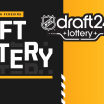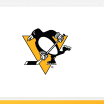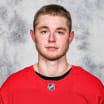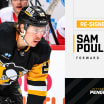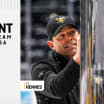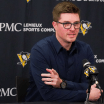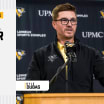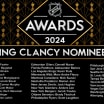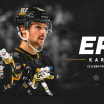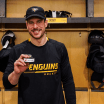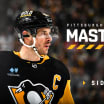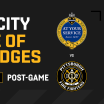"No Matter What Path You Take, All Roads Lead to Pittsburgh"
The Penguins hosted a Virtual Orientation Seminar this week for their 2020 NHL Draft picks
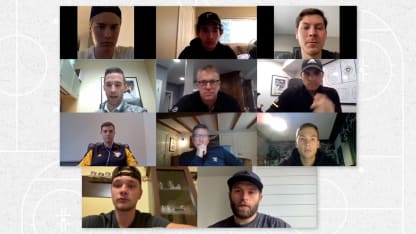
Due to the pandemic, the Penguins were unable to host their annual prospect development camp, where the players typically spend three days in Pittsburgh learning what it takes to become a professional athlete both on and off the ice.
So instead,
members of Pittsburgh's 2020 NHL Draft Class
- Joel Blomqvist, Calle Clang, Lukas Svejkovsky and Raivis Ansons - were introduced to the Penguins organization through three separate WebEx sessions.
The first was an Introduction, led by director of player development Scott Young, development coaches Tom Kostopoulos and Andy Chiodo and head coach Mike Sullivan. The second was Media Training, led by vice president of communications Jen Bullano Ridgley and director of communications Evan Schall. And the third was Strength & Conditioning and Nutrition, led by strength and conditioning coaches Alexi Pianosi and Alex Trinca.
The best part of the seminar - and something that may not have happened in the usual setting - is that the prospects got to hear from Penguins players Bryan Rust and Tristan Jarry, who joined the first session to discuss their respective paths and answer questions.
Check out the 2020 Virtual Development Camp
As the staff waited for the players to join the first session, Sullivan and Rust talked college football - Sullivan: "How do I know more about Notre Dame Fighting Irish football than you?" Rust: "I'm in Canada right now, there's not a whole lot of college football coverage!" - and pro football before getting down to business.
The session began with the prospects introducing themselves. Svejokvsky explained how he's from Point Roberts, Washington, where he crossed the Canadian border every morning growing up to play hockey and go to school - which inspired Sullivan to share his own experience with that part of the continent.
"Lukas, when I was coaching in Vancouver for the year that I was there, our head coach John Tortorella lived in Point Roberts," Sullivan said. "So I took a trip out there a number of times to have dinner at his house, and I got first-hand knowledge of Point Roberts. What a cool place that is. I thought it was interesting how he had to cross the border every day to go to practice, but he ended up being pretty good friends with all the customs guys, so it worked out pretty well. … The hockey world's a small world, and so we're thrilled to have you guys as part of our organization. I just want to take that time just to share that stuff with you."
After the staff introduced themselves, Young told the players what the role of the development staff is, how their No. 1 priority is to get them to play for the Pittsburgh Penguins and that they would be there for them every single step of the way.
He, Kostopoulos and Chiodo explained to the players how that process works. One line that Kostopoulos said was particularly resonant.
"What you'll find is that there's a lot of resources at your fingertips in this organization, so a lot of people can help you and guide you and direct you. The only thing we can't do for you is the work," Kostopoulos said. "You guys have to do the work."
After that, a video played featuring highlights of Brian Dumoulin, Tom Kuhnhackl, Carter Rowney, Dominik Simon, John Marino, Conor Sheary, Jake Guentzel, Rust and Jarry.
The video ended with footage of some of those players lifting the Stanley Cup and that oft-mentioned phrase: NO MATTER WHAT PATH YOU TAKE, ALL ROADS LEAD TO PITTSBURGH.
"That video gives me chills," Sullivan said. "It's awesome stuff. All those guys that you saw took different paths to get to the NHL. Some came through Wilkes-Barre, some didn't. Some came through college hockey, some came through Europe, some came through junior hockey. We've got all walks that are on our team. But we believe in the model that we have that helps guys developing ultimately get to Pittsburgh."
The head coach said his purpose for being on the call was to share what it means to be a Pittsburgh Penguin.
"What I would say to you is that to whom much is given, much as expected in return," said Sullivan, explaining to the prospects that Penguins ownership provides all of the necessary resources to allow the team to compete for a Stanley Cup every year.
He explained to the prospects what the team values in their players, as it goes a long way towards defining what it means to be a Pittsburgh Penguin, and that they all possess some combination of those ingredients - otherwise they wouldn't have been drafted.
"So now, it's up to you to take it to the next level," Sullivan said. "I think it's really important that you understand what we value in players, so that now you in turn can go out and try to get better and work on those aspects of your game each and every day. Because it's a daily endeavor, guys. You don't just snap your fingers and get to the NHL."
He also said it was important that the prospects leave the call with some understanding of what the Pittsburgh Penguins expect from them.
"I use a phrase with our guys all the time, and Rusty and Jars will probably chuckle when they hear me say it because I say it a fair amount around our guys in our dressing room," Sullivan said with a grin (and he was right). "I always use the phrase, 'control the controllables.' Those are the things that are within your control, and for me, it starts with three things: attitude, effort, and execution."
The expectation is for the prospects to bring those three intangibles from the second they wake up and brush their teeth in the morning. Because as Sullivan said to them, hockey is a hard game and a hard business, and "it's not always apple pie and ice cream."
Circling back to football, Sullivan told the prospects another quote that he has hanging on the wall in his office, this one from legendary Green Bay Packers coach Vince Lombardi.
"If we chase perfection, we can catch excellence," Sullivan said. "That's what we try to do in Pittsburgh each and every day. And you can ask Rusty, you can ask Jars - we push them hard every day. And the reason we push them hard is because we know they're capable of more. So our standards are high in Pittsburgh. Our standards are high in Wilkes-Barre. We're looking for guys that can thrive in that environment, that embrace the competition, and that embrace that daily endeavor. Because that's how that's how you become the best player that you can be, and ultimately optimize the skill sets that you've been given."
From there, Sullivan told the players about the Penguins' commitment to them - that they will utilize all of their resources to help them achieve their ultimate goal, lead by example, and provide opportunity.
He finished by giving them three final pieces of advice: embrace the process, trust the process, and bring it every day.
"And now you probably should hear from the guys that have been through it that are the most important guys in the call, and that's our players, Rusty and Jars," Sullivan said. "These guys can share a certain perspective, because it wasn't too long ago they were sitting in your shoes and we were having this conversation with them. I remember when I was the Wilkes-Barre coach, I went to London for the rookie tournament and Rusty was on that team. And here we are five years later, and he's got two Stanley Cup rings on his fingers. So that's the process. It's real. And these guys are living evidence."
Rust went first, and began by congratulating the draftees.
"You guys got picked into an unbelievable organization. You should take pride in that," he said. "But this is definitely where the work begins. I'll tell you a little bit about my path and the ups and downs, because there definitely are plenty."
Rust, who was drafted in the third round (80th overall) back in 2010, told them about how he really struggled during his sophomore season at Notre Dame.
"I didn't really have the year I wanted," he said. "That's where the development staff here, as well as my coaches at Notre Dame, really helped me get my head on straight after a few conversations."
Rust said that Bill Guerin, who was Pittsburgh's player development coach at the time, told him that his work ethic needed to be there.
"It didn't matter if I was too tired one day, if I felt like I was too busy or I had other things going on, I had to always get in the gym and always had to get on the ice to do the work," Rust said. "That's the key, and something that's kind of stuck with me ever since. It didn't really matter what I was doing, I knew that if I was working hard and if I was putting in the effort, then I would end up getting to where I wanted to be."
And even now that Rust has won two Stanley Cups and is coming off of a season where he set new career highs across the board with a team-leading 27 goals, 29 assists, 56 points, a plus-14, eight power-play goals and 151 shots - all in just 55 games - he said the ultimate message for the prospects to take away is to never be satisfied.
"There's always more," Rust said. "You can always be better. You can always get to somewhere higher. And it starts with your work ethic and just gets taken from there. It doesn't matter if things are good, things are bad. As long as you keep your mindset kind of headed towards the future - where you want to go and you work hard - I think the sky's the limit. Because as a guy who was never really highly touted as a prospect and kind of went under the radar, it definitely is very gratifying to succeed."
After Rust finished (to a thumbs up from Sullivan), Jarry - who was drafted in the second round (44th overall) back in 2013 - went next and talked about the challenges of turning professional after living with a billet family during his years of junior hockey with the Edmonton Oil Kings.
Jarry explained how his teammates helped him find a house and cook for himself. "That was something that I never had to do before, so it was a lot of learning and a lot of burning food," he said with a laugh.
On the ice, Jarry said the biggest thing that stood out to him in the American Hockey League was how he had to bring his best effort and always be better than the day before, and that utilizing the resources around him helped him do that.
"You have basically anything that you guys can think of," Jarry said. "And I think that was a big help for me, is if I needed something or needed something outside of hockey, I could talk to Andy or I could talk to (goalie coach) Mike Buckley or any of those guys. I think that was a big help and it helped me keep my head clear for hockey and helped me keep my head straight for where I wanted to be."
That was obviously the NHL, and Jarry said keeping the same mindset there was incredibly important as well.
Going back to the apple pie and ice cream analogy that Sullivan used, both Rust and Jarry were incredibly candid and honest about the challenges they faced, going into large amounts of detail about their respective experiences - particularly when it came to dealing with the mental aspect of being called up to the NHL and then getting sent back down to the AHL.
They also answered questions about the biggest differences between the two leagues, and the one thing they know now that they wish they knew then. For Rust, it was to stay even-keeled, and for Jarry, it was to have pushed himself even harder right from the start, particularly when going up against his most talented teammates.
Rust closed out the session with one final piece of advice for the prospects.
"Just make sure you trust these development guys," he said. "They have your best interests in mind. They're there to help you. And then also remember to have some confidence. You're put in certain situations for a reason. You guys are all great players in your own right. Know what makes you good and work at it, but also work at the things that may be weaknesses."
From there, the prospects went through Media Training. Bullano Ridgley and Schall told the prospects that from here on out, they represent the Pittsburgh Penguins and touched on the responsibilities that accompany that.
They told the prospects how media availability worked and explained to them what their media responsibilities would be, using Sidney Crosby as the example of someone who handles it incredibly well. They also offered advice and guidance for navigating social media and their own personal brands, with the main takeaway being to engage, communicate and have some fun while also being careful and cognizant.
The final portion of the seminar was arguably the most important for these young prospects looking to establish proper habits when it comes to their training and nutrition.
Pianosi began by explaining the organizational philosophy when it comes to strength and conditioning, telling the prospects that while it's easy to think of it in simple terms of exercises, sets and reps, there's actually so much more to it.
"Strength and conditioning encompasses sleep, your mental health and preparation, nutrition, soft tissue work, and your lifestyle choices away from the gym or the practice rink - what you're doing when you're not at the rink or training," Pianosi said. "With you guys just sort of starting the process as prospects trying to work towards that goal of being NHL regular players, your goal should be to learn how they're all connected and how they can help your performance."
Pianosi explained the concepts for hockey training that the Penguins feel are most important - single-leg strength versus double-leg strength, the sit position and T-spine mobility - before Trinca took over to explain what performance nutrition is.
He told them what that means, how it plays a role in their development as an athlete and how they can improve their current eating habits.
All in all, it was an incredibly informative day that accomplished a number of different objectives. The prospects got a crash course in what it takes to be a Pittsburgh Penguin, and received plenty of advice and guidance along the way.
"I think it's pretty clear through these last few hours that you guys get a good taste of the details of resources that we provide as an organization," Young said. "There might have been a lot of information given to you guys that you didn't even think about before. And there's even more. We tried to keep this brief for you guys. It's obviously a little bit of overloading, but we wanted to show you what we have going for you. And I know it's a little bit late over in Europe, but thank you guys for your patience and I think this has been very informative for everybody.
"I can't wait to work with you guys. We're really excited to have you. And hopefully things get back to normal and we can come out and watch you play soon."

